仁爱英语八年级下册Unit7Topic2导学案
- 格式:doc
- 大小:72.50 KB
- 文档页数:6
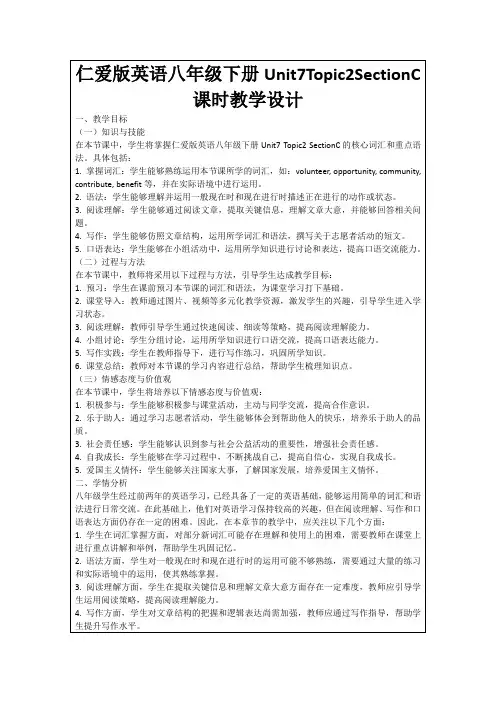
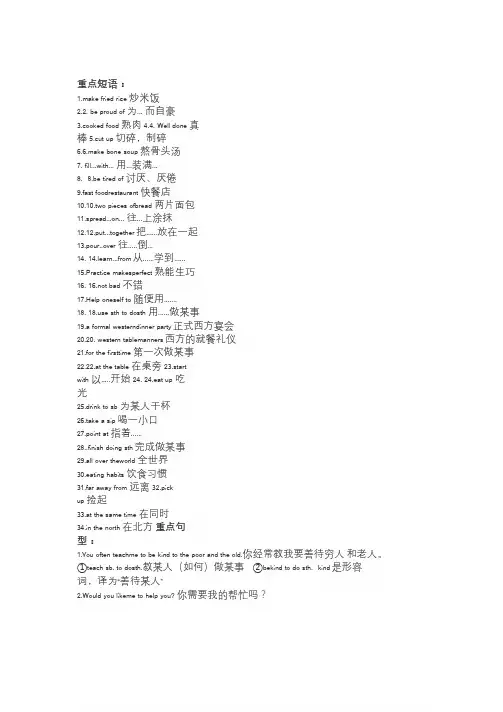
重点短语:1.make fried rice 炒米饭2.2. be proud of 为... 而自豪3.cooked food 熟肉4.4. Well done 真棒 5.cut up 切碎,制碎6.6.make bone soup 熬骨头汤7. fill...with... 用...装满...8. 8.be tired of 讨厌、厌倦9.fast foodrestaurant 快餐店10.10.two pieces ofbread 两片面包11.spread...on... 往...上涂抹12.12.put...together把......放在一起13.pour..over 往.....倒...14. 14.learn...from从......学到......15.Practice makesperfect 熟能生巧16. 16.not bad 不错17.Help oneself to 随便用.......18. e sth to dosth 用......做某事19.a formal westerndinner party正式西方宴会20.20. western tablemanners西方的就餐礼仪21.for the firsttime 第一次做某事22.22.at the table 在桌旁 23.startwith 以.....开始 24. 24.eat up 吃光25.drink to sb 为某人干杯26.take a sip 喝一小口27.point at 指着......28..finish doing sth完成做某事29.all over theworld 全世界30.eating habits 饮食习惯31.far away from 远离 32.pickup 捡起33.at the same time 在同时34.in the north 在北方重点句型:1.You often teachme to be kind to the poor and the old.你经常教我要善待穷人和老人。
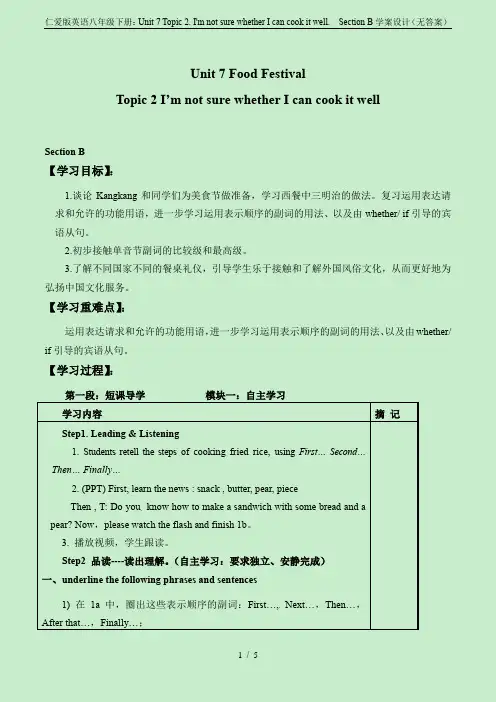
Unit 7 Food FestivalTopic 2 I’m not sure whether I can cook it wellSection B【学习目标】:1.谈论Kangkang和同学们为美食节做准备,学习西餐中三明治的做法。
复习运用表达请求和允许的功能用语,进一步学习运用表示顺序的副词的用法、以及由whether/ if引导的宾语从句。
2.初步接触单音节副词的比较级和最高级。
3.了解不同国家不同的餐桌礼仪,引导学生乐于接触和了解外国风俗文化,从而更好地为弘扬中国文化服务。
【学习重难点】:运用表达请求和允许的功能用语,进一步学习运用表示顺序的副词的用法、以及由whether/ if引导的宾语从句。
【学习过程】:第一段:短课导学模块一:自主学习学习内容摘记Step1. Leading & Listening1. Students retell the steps of cooking fried rice, using First… Second…Then… Finally…2. (PPT) First, learn the news : snack , butter, pear, pieceThen , T:Do you know how to make a sandwich with some bread and apear? Now,please watch the flash and finish 1b。
3. 播放视频,学生跟读。
Step2 品读----读出理解。
(自主学习:要求独立、安静完成)一、underline the following phrases and sentences1) 在1a 中,圈出这些表示顺序的副词:First…,Next…,Then…,After that…,Finally…;2) cut…into…把…切成…3) Would you mind if we learn to make it from you? 你介意我们跟你一起学做吗?4) Practice makes perfect. 孰能生巧嘛。
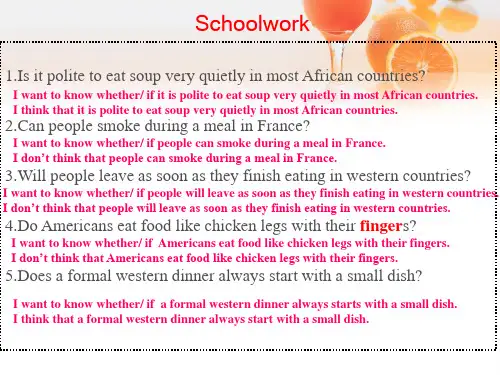
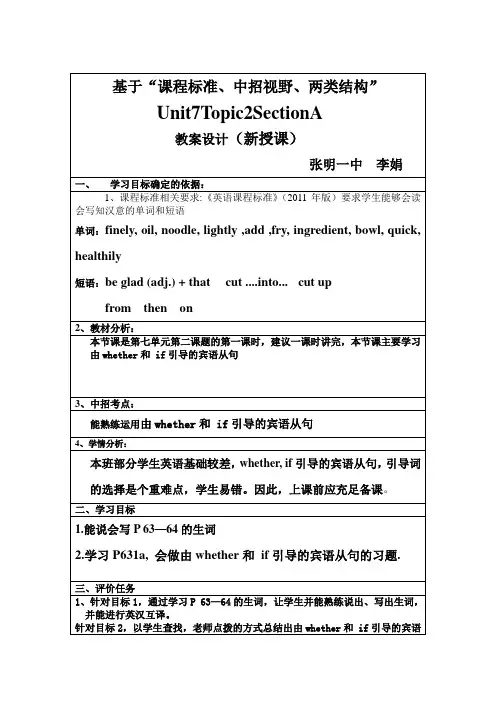
基于“课程标准、中招视野、两类结构”Unit7Topic2SectionA教案设计(新授课)张明一中李娟一、学习目标确定的依据:1、课程标准相关要求:《英语课程标准》(2011年版)要求学生能够会读会写知汉意的单词和短语单词:finely, oil, noodle, lightly ,add ,fry, ingredient, bowl, quick, healthily短语:be glad (adj.) + that cut ....into...cut upfrom then on2、教材分析:本节课是第七单元第二课题的第一课时,建议一课时讲完,本节课主要学习由whether和 if引导的宾语从句3、中招考点:能熟练运用由whether和 if引导的宾语从句4、学情分析:本班部分学生英语基础较差,whether, if引导的宾语从句,引导词的选择是个重难点,学生易错。
因此,上课前应充足备课。
二、学习目标1.能说会写P 63—64的生词2.学习P631a, 会做由whether和if引导的宾语从句的习题.三、评价任务1、针对目标1,通过学习P 63—64的生词,让学生并能熟练说出、写出生词,并能进行英汉互译。
针对目标2,以学生查找,老师点拨的方式总结出由whether和 if引导的宾语从句的用法和知识点。
四、教学过程学习目标教学活动评价要点要点归纳目标1、学习并能说出、写出P63-64的生词,并能进行英汉互译自学指导11.自学内容:P 63—64的生词.2.自学方法:先根据音标试读,同桌互相正音.3.自学时间:3分钟4.自学要求:会读,知道其汉语意思,并了解其词性.学生看书自学,教师巡视辅导。
自学检测1英译汉:finely adv.oil n.noodle n.lightly adv.add v.fry v.ingredient n.bowl n.quick adj.healthily adv.自学指导21.自学内容:课本P63的1a.2.自学方法:观看flash动画和精读.3.自学时间:6分钟4.自学要求:①完成1b.②找出whether引导的宾语从句.学生读对话;老师注视课堂。
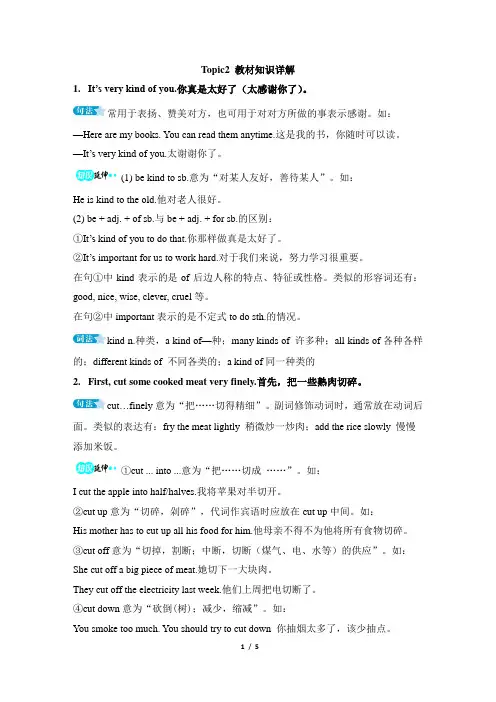
Topic2教材知识详解1.It’s very kind of you.你真是太好了(太感谢你了)。
常用于表扬、赞美对方,也可用于对对方所做的事表示感谢。
如:—Here are my books. You can read them anytime.这是我的书,你随时可以读。
—It’s very kind of you.太谢谢你了。
(1) be kind to sb.意为“对某人友好,善待某人”。
如:He is kind to the old.他对老人很好。
(2) be + adj. + of sb.与be + adj. + for sb.的区别:①It’s kind of you to do that.你那样做真是太好了。
②It’s important for us to work hard.对于我们来说,努力学习很重要。
在句①中kind表示的是of后边人称的特点、特征或性格。
类似的形容词还有:good, nice, wise, clever, cruel等。
在句②中important表示的是不定式to do sth.的情况。
kind n.种类,a kind of—种;many kinds of 许多种;all kinds of各种各样的;different kinds of 不同各类的;a kind of同一种类的2.First, cut some cooked meat very finely.首先,把一些熟肉切碎。
cut…finely意为“把……切得精细”。
副词修饰动词时,通常放在动词后面。
类似的表达有:fry the meat lightly 稍微炒一炒肉;add the rice slowly 慢慢添加米饭。
①cut ... into ...意为“把……切成……”。
如:I cut the apple into half/halves.我将苹果对半切开。
②cut up意为“切碎,剁碎”,代词作宾语时应放在cut up中间。
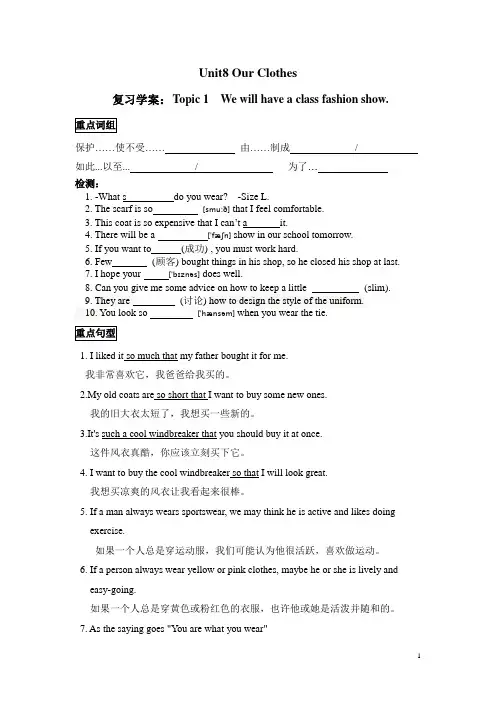
Unit8 Our Clothes复习学案:Topic 1 We will have a class fashion show.保护……使不受……由……制成/如此...以至... / 为了…检测:1. -What s do you wear? -Size L.2. The scarf is so [smu:ð] that I feel comfortable.3. This coat is so expensive that I can’t a it.4. There will be a [ˈfæʃn] show in our school tomorrow.5. If you want to (成功) , you must work hard.6. Few (顾客) bought things in his shop, so he closed his shop at last.7. I hope your [ˈbɪznəs] does well.8. Can you give me some advice on how to keep a little (slim).9. They are (讨论) how to design the style of the uniform.10. You look so [ˈhænsəm] when you wear the tie.1. I liked it so much that my father bought it for me.我非常喜欢它,我爸爸给我买的。
2.My old coats are so short that I want to buy some new ones.我的旧大衣太短了,我想买一些新的。
3.It's such a cool windbreaker that you should buy it at once.这件风衣真酷,你应该立刻买下它。
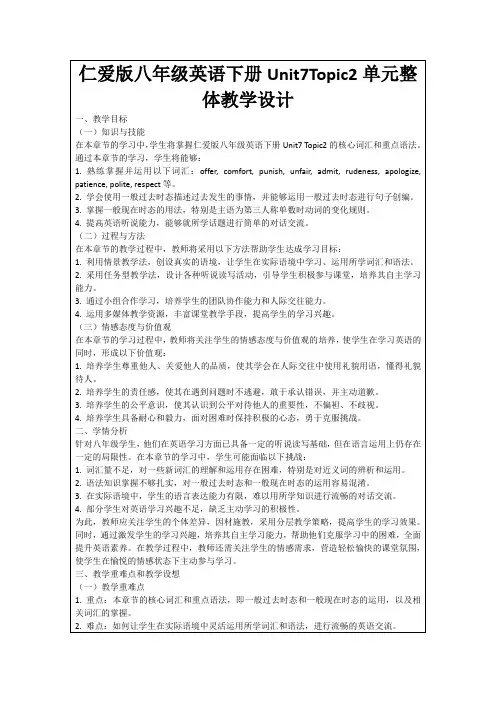
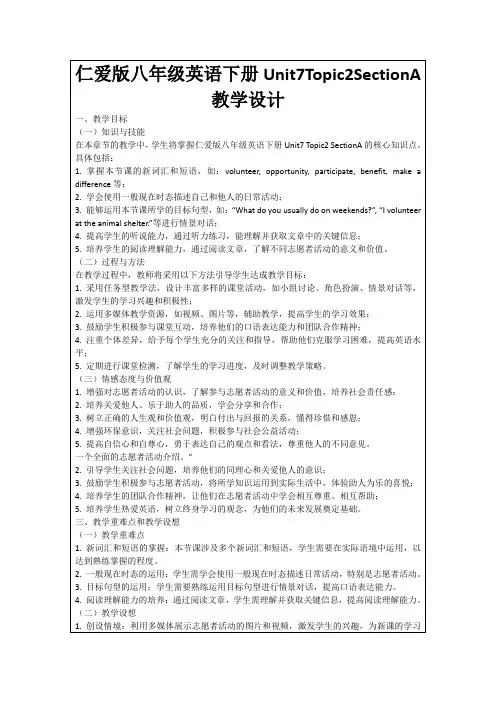
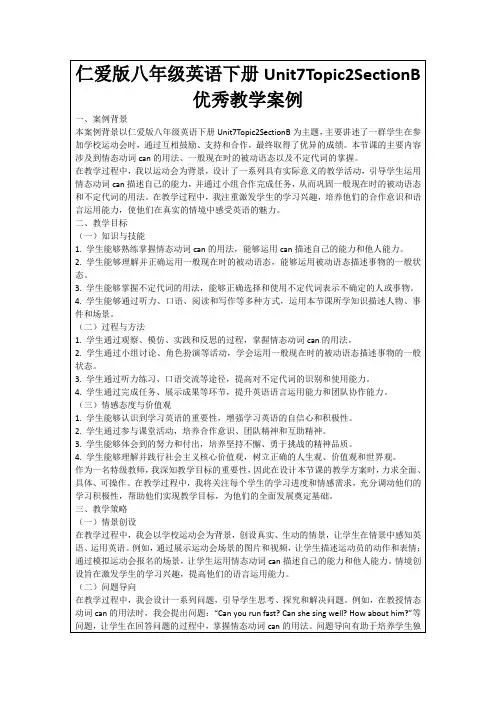
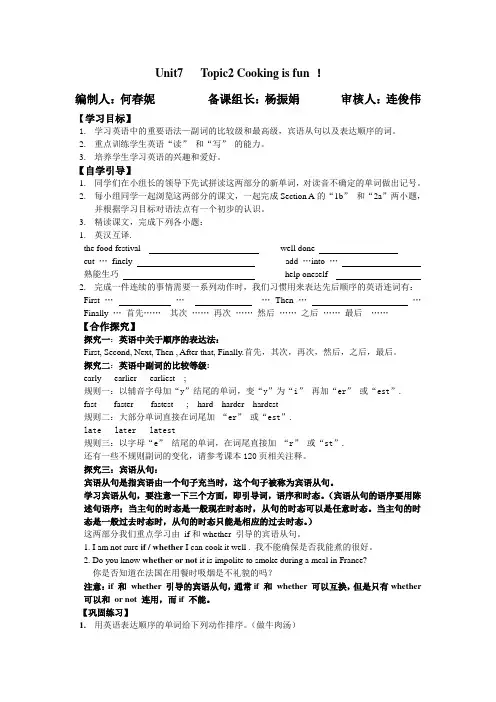
Unit7 Topic2 Cooking is fun!编制人:何春妮备课组长:杨振娟审核人:连俊伟【学习目标】1.学习英语中的重要语法—副词的比较级和最高级,宾语从句以及表达顺序的词。
2.重点训练学生英语“读”和“写”的能力。
3.培养学生学习英语的兴趣和爱好。
【自学引导】1.同学们在小组长的领导下先试拼读这两部分的新单词,对读音不确定的单词做出记号。
2.每小组同学一起浏览这两部分的课文,一起完成Section A的“1b”和“2a”两小题,并根据学习目标对语法点有一个初步的认识。
3.精读课文,完成下列各小题:1.英汉互译.the food festival well donecut…finely add…into…熟能生巧help oneself2.完成一件连续的事情需要一系列动作时,我们习惯用来表达先后顺序的英语连词有:First………Then……Finally…首先……其次……再次……然后……之后……最后……【合作探究】探究一:英语中关于顺序的表达法:First, Second, Next, Then , After that, Finally.首先,其次,再次,然后,之后,最后。
探究二:英语中副词的比较等级:early earlier earliest ;规则一:以辅音字母加“y”结尾的单词,变“y”为“i”再加“er”或“est”.fast faster fastest ; hard harder hardest规则二:大部分单词直接在词尾加“er”或“est”.late later latest规则三:以字母“e”结尾的单词,在词尾直接加“r”或“st”.还有一些不规则副词的变化,请参考课本120页相关注释。
探究三:宾语从句:宾语从句是指宾语由一个句子充当时,这个句子被称为宾语从句。
学习宾语从句,要注意一下三个方面,即引导词,语序和时态。
(宾语从句的语序要用陈述句语序;当主句的时态是一般现在时态时,从句的时态可以是任意时态。
Unit7 Topic2 SectionC参考教案Ⅰ. Material analysis本节课建议用1课时上完。
主要活动为Section C 的1a和2。
本课的阅读部分呈现的是谈论西餐的餐桌礼仪,来引出中西方饮食文化方面的差异,学习有关餐具的词汇,掌握有关就餐的短语,语法方面继续学习由whether和if 引导的宾语从句。
老师要让学生在对比中西餐桌不同礼仪的过程中,让学生互帮互学,开阔视野,既要促进新知的形成,又要激发学生探究学习、自主学习的热情。
在指导学生学习第二部分关于更多不同国家的餐桌礼仪时,要引导学生在了解中国风俗文化的同时,乐于接触和了解外国风俗文化,从而更好地为弘扬中国文化服务。
Ⅱ. Teaching aimsKnowledge aims:1. 继续学习whether/ if 引导的宾语从句。
2. 谈论西餐的餐桌礼仪。
3. 更多地了解不同国家的餐桌礼仪。
1/ 19Skill aims:1. 能听懂有关餐桌礼仪的短文,识别主题,并获取主要信息。
2. 能使用英语简述西餐的餐桌礼仪。
3. 能从所给语言材料中找出现关信息,理解大意。
4. 能写出简单的文段。
Emotional aims:1. 互帮互学,开阔视野。
2. 乐于接触和了解外国风俗文化,从而更好地为弘扬中国文化服务。
Ⅲ. The key points and difficult pointsKey points:1. 继续学习whether/ if 引导的宾语从句。
2. 谈论西餐的餐桌礼仪。
3. 了解不同国家的餐桌礼仪。
2/ 19Difficult points:演示西餐的餐桌礼仪。
Ⅳ. Learning strategies了解不同国家的餐桌礼仪有助于更好地进行跨文化交流。
Ⅴ. Teaching aidsComputer multimedia projector; The utensils mentioned in this section; Videos of a formal western dinner and a Chinese dinner.Ⅵ. Teaching proceduresIntroduction(8 minutes)1. Greet students ready for learning.2. Teacher lets the students retell the steps of making the sandwich, with First…Second…Then…Finally…3. Teacher asks the students to report the table manners in different countries they searched. Tell them3/ 19that they must follow the manners when they go to different countries.4. Teacher asks the students to read the sentences of 2. Teach the new words elbow, spoon and chopstick by showing the teacher’s elbow, a spoon and chopsticks.5. Teacher lets students discuss if these actions are polite.6. Teacher asks students to match the pictures with the conversation.7. Teacher lets students check the answers.8. Teacher divides the students into two groups. Let them practice the conversations. One group reads the questions and the other group reads the answers. Then let them change the roles. Finish 2. Presentation (10 minutes)1. Teacher asks the students to read 1a again, and then finish 1b. Teach the new word dine.2. Teacher asks two students to tell the answers.3. Teacher plays the recording sentence by sentence.4. Teacher plays the recording without stopping.4/ 195. Teacher lets the students read 1a, and then asks them to learn in groups to find out the difficult points. At last let them sum up the main points of the conversation.6. Teacher makes a summary to explain key points and difficult points to the students:(1) table manners(2) eat up(3) whether…or not …(4) drink to sb./sth.(5) take (only) a little(6) Remember not to …7. Teacher lets pairs of students prepare for the retelling with the help of the questions on the screen: What should you do when you sit down at the table?What does the dinner start with?What should you do when you start eating?5/ 19What should you do when you drink to somebody?Practice (10 minutes)1. Teacher asks the students to retell the passage in pairs. One student does some actions and the other describes in English.2. Teacher lets students evaluate the performances.3. Teacher lets students read 1a again and underline the key points about western table manners.4. Teacher plays a video about a Chinese dinner. Then let students work in groups and compare them with western table manners.5. Teacher lets two or three students report their results of comparing.6. Teacher asks two or three students to perform about the western table manners and the Chinese table manners.7. Teacher evaluates the performances and makes a summary.8. Teacher lets students read the example of 3.6/ 199. Teacher lets students understand the meanings of the sentences of 3. Teach the new word finger by pointing out the fingers of himself or herself.10. Teacher lets students discuss eating customs in different countries.11. Teacher lets students practice the conversations in pairs. Let them grasp the usage of object clauses. Production (7minutes)1. Teacher asks the students to prepare the game of describing: One student does an action of Part 2 or 3,a student from other groups describes the action in English. Ask the students to consolidate the usage of object clauses. The group which can describe correctly the most is the winner.2. Teacher lets students write a short passage about table manners in China, using object clauses and the information they have collected in 1c.3. Teacher lets two students write down the short passage on the blackboard.4. Teacher lets students discuss and evaluate the two students’written work, and then make a summary.5. Teacher shows the summary of this section to the students.7/ 196. Teacher assigns homework:(1) Review the summary after class.(2) Tell the western table manners to your parents.(3) Collect some eating habits in different countries.Teaching ReflectionThere are many differences between western table manners and Chinese table manners. Students are interested in trying showing the differences by themselves. And after the practicing of this section, they grasp the usage of object clauses very well.Ⅶ. Blackboard designUnit 7 Food FestivalTopic 2 I’m not sure whether I can cook it well.Section C1. table manners8/ 192. eat up3. whether…or not …4. drink to sb./sth.5. take (only) a little6. remember not to …Unit7 Topic2 SectionC参考教案Ⅰ. Material analysis本节课建议用1课时上完。
Unit 7 Food Festival课题:Topic 2 I’m not sure whether I can cook it well.Section A一、学习目标I.单词:pan, pot, cooker, bowl, oil, ingredient, pork, ham, onion, noodle, junkfood; add, fry, cut; finely, lightly, quick, healthilyII.词组:make fried rice, be proud of, cook very carefully, cooked meat, add some bones to, boil some water, well done, make bone soup, cut up ham, fill...with..., taste good III.句型:1. I’m not sure whether I can cook it well.2.I’m proud of you.3.It’s very kind of you.4.Well done!5.Y ou need to add the rice slowly.6.First, ... Second, ... Next, ... Then, ... After that, ... Finally, ...IV.功能:讲述做菜步骤.二、I.听音正音1.根据 P134 U7T2(63) (64)页的单词音标,试读两遍;听单词录音,跟读正音;看音形义性熟背,默写.2.听U7T2 SA 1a 的录音,完成 1b.听 1a 录音,跟读三遍.II.自查自悟读 1a、2a、3a, 找出下列重点短语,翻译并熟记.(1)做炒饭(3)做得好(5)用......装满.....III.自学互学(2)为... 感到骄傲(4)切碎火腿1.我不确定是否能做好它.【文中原句】I’m not sure whether I can cook it well.注意:if (1) “如果“,引导”主将从现”.(2)“是否”,引导宾语从句时=whether,应注意从句时态的变化:当主句是一般现在时时, 从句的时态根据实际情况而定;当主句是一般过去时时,从句也是一般过去时;当从句描述客观事实时,只能用一般现在时,此时,与主句时态无关.(3)只能用 whether 的情况:与 to do 连用;与 or not 连用;做介词宾语等.“文中原句“=I’m not sure I’m thinking aboutHe doesn’t mindI can cook it .I will appear at his party. it’s good ornot.2.你真是太好了.(太感谢你了.)【文中原句】It’s kind of you.【拓展】It’s+adj.+of sb.+to do sth.与It’s+adj.+for sb.+to do sth.的区别:当形容词形容 sb.的品质时,用介词 of;当形容词形容 to do sth.的性质时,用 for.请思考:(1)It is very helpful you to help me.(2)It is very important us to learn English well.3.首先,精细地切些熟肉.【文中原句】First, cut some cooked meat very finely.副词修饰动词时,通常放在动词后面.(1)认真地烹饪(2)小心地把锅放到炊具上(3)轻轻地炒一炒肉4.干得好!【文中原句】!表示表扬和鼓励的句子.类似的表达还有:Very good!非常好!Wonderful!非常好! Excellent!好极了!Perfect!太棒了 Good job! 干得好!5.你需要慢慢的添加米饭.【文中原句】You need to the rice .【拓展】add v. 增加,添加; add to... 添加到......上;add... to...将......加到上;(1)如果茶太浓, 就加点水.(2)4 加6 等于 10.If yousome water if the tea is too strong.4 _ 6, you can get 10.(3)你有什么要添加到清单上吗?Do you have anything to6.第二步,然后把火腿、白菜和青菜细细地切碎.the list?【文中原句】Then harm, and green .(1)完成一件事需要一连串的动作,需要一些表示先后顺序的副词.First, ...Second, ... Next, ... Then, ... After that, ... Finally, ...首先......,其次......,接下来......,然后......,之后......,最后......(2)cut... up(动副短语)将... 切碎.【拓展】cut sth.切开;cut sth. into (small pieces)将切成(碎片)昨天他割伤了自己.He厨师把牛肉切成薄片.The cook himself yesterday.the beef thin slices.【拓展】cut off 切断;中断;cut down v. 削减;砍倒;cut in 插嘴;超车;插入cut out 切断;删去;停止;关掉cutback 削减;修剪;cut short v. 缩短;打断;缩减cut from 从…上切下cut through 刺穿;抄近路走过四、当堂检测I.用所给词的适当形式填空1.The tea is too strong. You need (add) some more water slowly.2.Dongdong is preparing the (cook) meat now.3.I think rice is grown in the (south) part of China.4.Can you say five kinds of fruit (immediate)?5.They are always smiling and friendly and (politely) to passengers.II.阅读短文,根据语篇要求填空,使短文通顺、意思完整.每空限填一词.Kangkang wants to make fried rice for their food festival.But he is not sure he can cook it well. His mother is of him because he is trying to help others. She tells Kangkang to cut some cooked meat veryfirst, put some oil in the pan,and then fry the meat . After that,Kangkang needs to add the rice slowly, fry it for a few minutes and finally add some salt. He thinks is fun!一、学习目标U n i t7F o od Festival课题:Topic 2 I’m not sure whether I can cook itwell.Section BI.单词:snack, butter, pear, piece; slurp; impolite, polite, noisilyII.词组:favorite snack, a sandwich with butter, how to make it, two pieces of bread, put...over, put...together, cut...into small pieces, learn to make it from you,quite well, do better, do bestIII.句型:1. Could you tell us how to make it?2.Take two pieces of bread and put some butter on them.3.Would you mind if we learn to make it from you?4.You did quite well. But I think you did better than I. Michael did best of all.5.Practice makes perfect.6.I don’t know if it is polite in Japan.IV.功能:做菜步骤;副词比较级、最高级.二、自I.听音正音1.根据 P134 U7 T2 (65) (66) 页的单词音标,试读两遍;听单词录音,跟读正音;看音形义性熟背,默写.2.听U7T2 SB 1a 的录音,完成 1b.听 1a 录音,模仿跟读三遍.II.自查自悟读 1a、1c, 找出下列重点短语,翻译并熟记.(1)最喜欢的小吃(2)怎么做(三明治)(3)两片面包III.自学互学(4)切成碎片1.你介意我们向你学习做三明治吗?【文中原句】Would you mind if we learn _to makeit from you?learn 用法归纳:learn sth 学习……; learn to do sth 学习做某事;learn sth by oneself 自学……=teach oneself sth;learn (…) from sb 向某人学习(做某事);和 study 的区别:study 可以作不及物动词,如I’m studying now. study 也可以作不及物动词,不过 study sth 更强调研究…, learn 强调学习具体的知识,如 learn English.2.你做得很好.【文中原句】You did quite .但是我认为你比我做得好.【文中原句】But I think you did than I.我们所有人中迈克做得最好.【文中原句】Michael did .well, better, best 都是副词,作动词 did 的状语.better, best 是 well 的比较级和最高级.【拓展】形容词、副词有三个等级,即原级、比较级和最高级.(1)形容词、副词比较等级的构成.①副词比较等级的规则变化与形容词比较等级的规则变化大致相同.fast-- late-- slowly-- hard --noisily-- _ quickly-- _②下列副词的比较等级为不规则变化:badly -- little -- well-- much--far-- /(2)形容词和副词比较等级的用法.①原级:双方程度相同时,常用结构:as+adj./adv. 原级+as,意为:......和......一样.... .否定形式:not as/so+adj./adv.原级+as,意为:......不如... .他跑得如此快.He runs so .莫扎特和他姐姐弹得一样好.Mozart played his sister. Maria 没有 Jane 学习努力.Maria doesn’t study Jane.② 比较级:两者比较时,常用结构:adj./adv.比较级+than,意为:比......更 ....... .否定形式:less+adj./adv.原级+than,意为:......不如 ... . 他比我游得好.He swam _________________ than I. 他做作业比他哥哥认真.He does homework than his brother. 他工作的时间比以前少了.He works than he used to. ③ 最高级:三者或三者以上作比较时,常用结构:the+ adj./adv.最高级+ in/of/among....... (比较范围),意为:某人(或某物)在某范围内最 ........ .副词最高级前可省略 the. Michael 在我们班跳得最高.Michael jumps in our class. 我是我们班跳得最远的.I jump in my class.3. 我不知道在日本这么做是否有礼貌.【文中原句】 I don’t know if it’s polite in Japan.if conj. 是否,引导宾语从句,不可省略. 四、当堂检测 I. 单项选择( )1. Could you tell me ___it is true or not?A. ifB. whetherC. thatD. what( )2. It’s polite___up your hand before answering the questions.A. putB. puttingC. putsD. to put( )3. In Japan, it’s polite to eat soup___and finish all the rice.A. noisilyB. noiseC. noisyD. noises( )4. We’re not sure___we will go out tomorrow. We will go swimming ___it is sunny.A. if; whetherB. if; thatC. whether; ifD. what; if( )5. -Do you think Michael works ___ than Kangkang and Jane?-Yes, I think so. He works ___of the three.A. hard; harderB. harder; hardestC. hardest; hardD. hardest; harderII.用方框内所给词的适当形式填空Micheal’s favorite snack is a sandwich butter, honey and a pear. Do you knowto make it?, take two pieces of bread and put some butter on them. Next, cut a pearinto small pieces . Then put them on the bread lightly. After that, put some honey the pear slowly. Finally, put the pieces of bread . Micheal,Janeand Kangkangthe sandwich together. Kangkangverywell. Jane did better. Micheal didof all. We all know that practice makes .一、学习目标 Unit 7 Food Festival课题:Topic 2 I’m not sure whether I can cook itwell.Section CI. 单词:formal,manner,napkin,fork, dish,quietly,dine,spoon,chopstick,finger, lap,elbow. II. 词组:for the first time, table manners, eat up, drink to sb./ sth. III. 句型: 1. It’s polite to eat up the food on your plate.2. You don’t know whether it’s polite or not to speak loudly at the table.3. Remember not to drink too much. IV. 功能:谈论不同国家的餐桌礼仪.二、make, together, good, one, how, do, perfect, with, over, careI.听音正音1.根据 P134 U7 T2(67)(68)页的单词音标,试读两遍;听单词录音,跟读正音;看音形义性熟背,默写.2.听U7T2SC 1a 的录音,完成 1b、1c.听 1a 录音,跟读三遍.II.自查自悟1.读1a,找出下列重点短语,翻译并熟记.(1)以...开始(3)吃光(5)举起杯子(7)指向某人III.自学互学(2)餐桌礼仪(4)为某人敬酒,干杯(6)喝太多1.如果你首次参加一个正式的西餐聚会,你最好知道一些西方的餐桌礼仪.【文中原句】If you go toa dinner party , you had better knowabout .(1)for the first time 第一次2012 年,我第一次到北京去度假.I went to Beijing for my holiday in2012 .(2)table manners 餐桌礼仪manner“方式;举止;态度”He has no at all. 他一点也没礼貌.2.吃光盘中的食物是礼貌的.【文中原句】It’s polite the foodthe plate.eat up 动副结构:吃完,吃光他如此饿,以至于吃完了所有的食物.He was so hungry he allthe food.把它吃光!Eat !【拓展】come up 上升; cut up 切碎; get up 起床give up 放弃; go up 上涨; stay up 熬夜; take up 占用;3.可能你不知道在用餐时大声说话是否礼貌.【文中原句】you don’t knowwhether it’s polite to speak loudly the table.whether , if 的用法我们在 Section A 中已经学过,现在来复习巩固一下.(1)引导宾语从句时,可互换.He asked me Tom was late.他问我 Tom 是否迟到了.(2)whether 后可接 or not,而if 不能.He doesn’t know it’s right or not.他不知道这是否是对的.(3)不定式前用 whether 而不用 if.I don’t know?/to go or to stay at home.我不知道是该走还是该留在家里.(4)介词后用 whether 而不用 if.I’m thinking about to leave right now.我在考虑是否马上离开.(5)注意引导宾语从句时从句的时态变化.My teacher told me the earth round the sun. 老师以前告诉我地球绕着太阳转.He wondered if she .他想知道她是否会来.4.记得不要喝太多.【文中原句】Remember _drink too much.(1)remember to do s th.记得要做某事; remember doing s th.记得做过某事(事情已经做了),否定形式为:remember not to do sth. .Please remember the door.请记得关门.Iremember the door. 我记得关上门了.Remember late. 记着别迟到啊.(2)too much 在句中作状语,修饰动词 drink.【区分】much too “太,非常”,修饰形容词或副词.too much 修饰动词或动词短语及不可数名词;too many 修饰复数名词Don’t eat candy, or you will be ____________ fat.不要吃太多糖,否则你会很胖.Although apples are good, still don’t eat of them.四、当堂检测I.汉译英.[来来~源:%^*中教网&]1.露西昨天吃完了冰箱里的所有苹果.Tom the in thefridge. 2.我们的问题是如何能给丹尼尔筹钱.Our problem is raise money Daniel.3.这鱼闻起来真美味.我想把它吃完.The fish . I want to .4.(为了) improve his oral English, he often goes to the English corner.5.Our English class often (以……开始) a lively song, so we all like it.6.When he was (为……干杯) me, I gave him a hug.7.The child is at the age of two, he needs someone to (切碎) his food for him.II.把下列句子合并成一个含有宾语从句的复合句.1.I don’t know. Is she a nurse?2.Do you know? Is it good to play games too much?3.I’m not sure. Is he at school?4.I want to know. Will it be sunny tomorrow?5.I don’t know. Is it polite to eat up the food on your plate?一、学习目标Unit 7 Food Festival课题:Topic 2 I’m not sure whether I can cook itwell.Section DI.单词:southern, pick, courseII.词组:pick up, around the world, use … to do …III.句型:1. People around the world have different eating habits.2.There are two or more courses for every meal and people use knives and forks to eat.3.In parts of India, people use their fingers to pick upthe food. IV.复习 whether/if 引导的宾语从句的用法.副词的比较级.V.功能:谈论不同国家的饮食风俗.I.听音正音1.根据 P136 U7 T2(69)(70)页的单词音标,试读两遍;听单词录音,跟读正音;看音形义性熟背,默写.2.听U7T2SD 1 的录音,模仿跟读三遍.3.Read the passage again and underline all the different eating habits in different areas.II.自查自悟读 1a、1c, 找出下列重点短语,翻译并熟记.(1)远离(3)同时III.自学互学(2)用…做某事1.全世界的人们有不同的饮食习惯.【文中原句】People havedifferent eating .around the world = all over the world = throughout the world “全世界”那是众所周知的. It is known【拓展】living habit 生活习惯; learning habit 学习习惯2.在北美,澳大利亚和欧洲,每顿饭有两道或两道以上的主菜,人们用刀叉吃饭.【文中原句】 In and , there are two or more each meals and peopleuse_and forks .(1)course 可数名词,意为“一道菜”.主菜是烤鸭.Themain(2)A knife and a forkA knife and forkis the roast duck.(be) on the table. 一把刀和一把叉在桌上. (be) on the table. 一副刀叉在桌上.3.在印度有些地方,人们用手指头拿食物吃.【文中原句】In parts of , people use their fingers the food.(1)pick up 拿起,捡起;接某人;取某物;搭便车.电话铃响了,我拿起了话筒.The phone rang and I 我的哥哥会开车来接你的.My brother willityou.in the car.(2)use … to do sth 表示“用…做某事”还可以表达成use… for doing sth. 如:We can use QQ (talk) /for(talk) with each other.4.在中国的南方人们吃米多,而在北方人们常吃面食.【文中原句】In China, people eatrice a lot, in the_people often eat _ .south, n. 南方;southern, adj. 南方的海南岛在中国的南部.Hainan island is in the of China.【拓展】north → northern, east → eastern, west → western四、当堂检测I.完成下列句子:1.汤姆跑的和杰克一样快.彼得跑的最快.Tom runs Jack. Peter runs of all.2.朱迪舞跳得比我好.玛丽是所有的女孩中跳舞跳得最好的.Judy dances than me. Mary dances of all the girls.3.他打篮球比你棒的多.He plays basketball than you.4.雪下得越来越大.It is snowing .5.我想去中国南部的名胜古迹看看.I hoe to visit some in the part of China.II.单项选择:( )1.All Chinese use chopsticks .A. eatB. to eatC. eatingD. ate( )2. I don’t know if Kangkang ,if he _ ,I will call you.] A. will come; will come B. will come; comesC. comes; will comeD. comes; comes( )3. Yesterday Jane’s mother was ill, so she help me.A. needed notB. doesn’t need toC. needn’tD. didn’t need ( )4. Would you mind the door?A. openB. opensC. openingD.I open( )5.–Would you mind if I smoke here? .......... You had better not.A. Of course notB. SorryC. Of courseD. Certainly notⅢ. 句型转换.1.Would you mind opening the door?(改为同义句)Would you mind ________ open the door?2.My favorite food is dumplings. (对划线部分提问)favorite food?3.Do people in India eat with their right hands? Can you tell me?(合并为含宾语从句的句子)4.These courses aren’t the same as those ones. (改为同义句) These courses are _ those ones.5.You’d better cook chicken soup tonight. (改为否定句) You’d cook chicken soup tonight。
八年级英语Unit 7 ,Topic 2导学案一、重要句子1.Would you mind if we learn to make it from you? Michael did best of all.2.Practice makes perfect. Help yourself to some soup.3.It's impolite to eat so noisily4.I don't know if it's polite in Japan.5.It's polite to do that. If you go to a formal western dinner party for the first time, you'd better know about western table manners.6.It's polite to eat up the food on your plate.7.When you drink to somebody, you'd better raise your glass and take only a sip.8.Remember not to drink too much.9.People around the world have different eating habits.10.Do you know if people in the south of China often eat noodles?11.Yes, I think so. No, I don't think so.四、重要知识点if /whether 引导宾语从句时指“是否”如:1. I don’t know if/whether it's polite in Japan.2. Could you tell me if/whether it’s polite to speak loudly at the table?3. Do you know whether or not it's impolite to smoke during a meal in France.练习:1. I don’t know ____ he is right or not. A. that B. whether C. if2. I don’t know ____ it’s polite or not to eat with our arms or elbows on the table in America.A. ifB. whetherC. that3. ---Would you mind if I learn English from you? ---__________. I am very glad to teach you.A. Of course not.B. You’d better not.C. Sounds great.Whether/if 引导的宾语从句的一般疑问句及其答语Eg: Can you tell me if/whether Chen Xueping and Chen Xiaoyan did well in the English exam? Yes, I think so. No, I don't think so.形容词副词比较级和最高级But I think you did better than me. Wow, Michael did best of all.Zheng Y unyun is tall. Zheng Weizhong is taller than him.Zheng Weizhong is the tallest of all.练习:Which one goes ____, the car, the train or the plane?1. A. fast B. faster C. fastest2.Whether 或if的区别1.Whether引导的宾语从句可以移到句首,if则不能。
练习:I can't say whether this is true or not.= this is true or not, I can't say.这是不是真的,我不敢说。
2.介词之后的宾语从句,用whether,不用if。
练习:I'm interested in she likes English.我感兴趣的是她是否喜欢英语。
3.不定式前用whether,不用if。
练习:She asked me to start early.她问我是否早点出发。
4.If 除了意为“是否”,还有“如果,假如”之意,用在条件状语从句中。
练习:He is going to Beijing it doesn't rain tomorrow.如果明天不下雨,他打算去北京。
I.选择题1. It is very kind him to help others.A. forB. toC. atD. of2. — Miss Lee, we won in the sports meet again. —I’m proud of you.A. What a pityB. Well doneC. I’m sorry to hear thatD. How interesting3. We’d better drink water when we are thirsty. It’s good for our health.A. boiledB. boilingC. cookedD. cooking4. Please put the pork into plate.A. otherB. another’sC. othersD. another5. One of the western fast food is you can eat it in a few minutes.A. disadvantagesB. advantageC. advantagesD. disadvantage6. A lot of people like eating out now because they’re cooking.A. pleased withB. tired ofC. interested inD. surprised at7. Then, the glass 60% full boiled water.A. put, intoB. fill, inC. fill, withD. add, to8. — What will you do first if you make dumplings? — First, I will cut up the meat .A. finelyB. fineC. finallyD. good9. The lake is more than 20 meters . So it must be dangerous to swim there.A. longB. wideC. deepD. deeply10. Jane’s favorite smack is a sandwich with ham. She often eats it because it’s deliciousand . A. cheap B. low C. top D. expensive1. I would like a sandwich honey. A. of B. in C. for D. with2. — Would you mind if I learn to make beef noodles you?— Of course . A. from, don’t B. from, not C. for, don’t D. for, not3. Could you tell me it is true or not? A. if B. whether C. that D. what4. I t’s polite up your hand before answering the questions.A. putB. puttingC. putsD. to put5. Do you know smoke during a meal in China?A. if is it polite toB. if it is polite toC. whether is it polite toD. whether it is polite6. In Japan, it’s polite to eat soup and finish all the rice.A. noisilyB. noiseC. noisyD. noises7. We’re not sure we will go out tomorrow. We will go swimming it is sunny.A. if, whetherB. if, thatC. whether, ifD. what, if8. After that, pour some honey the pear, , put them together.A. on, FinalB. over, FinallyC. above, FinallyD. with, Final9. — How do you like the soup? — (Slurp!) I like it very much.A. Not goodB. Not wellC. Not badD. Very bad10. — Do you think Michael works than Kangkang and Jane?— Yes, I think so. He works of the three.A. hard, harderB. harder, hardestC. hardest, hardD. hardest, harder11. — I went to a formal western dinner the first time last evening.— What did the dinner start ?A. in, fromB. for, withC. at, fromD. on, with12. It’s not polite to speak loudly .A. at tableB. at deskC. by tableD. by desk13. Bad luck, took away my new watch.A. everybodyB. nobodyC. anybodyD. somebody14. He went out as soon as he finished his homework.A. doB. to doC. doingD. did15. He pointed the gun her head.A. toB. atC. onD. in16. Remember a letter to him.A. don’t writeB. doesn’t writeC. not to writeD. not writing17. Eat the food on your plate, or it is a waste.A. upB. outC. offD. over18. — Is it polite or impolite to eat with your left hand in Islam?— I think eat with your left hand in Islam.A. is it impolite toB. it is impolite toC. is it polite toD. it is polite to19. All Chinese use chopsticks .A. to eatB. eatC. eatingD. eats20. In the part of China, people eat rice, and in the north they eat noodles.A. southsB. southesC. southernD. south21. Do you know or not it is polite to smoke during a meal in France?A. ifB. whetherC. thatD. what22. take more food than you need.A. NotB. Not toC. Doesn’tD. Don’t23. My house is a few minutes’ walk our school.A. away fromB. far awayC. far away fromD. far from24. I will send an e-mail to him I have time.A. thatB. whatC. whetherD. if25. The cakes in this shop are different from in other shops.A. onesB. thoseC. /D. themIII.句型转换1. Could you tell me? Will you come tomorrow?(合并成一句)Could you tell me come tomorrow.2. I want to know. Is it polite to smoke during a meal in France?(合并成一句)I want to know polite to smoke during a meal in France.3. Would you mind smoking here?(宾语改为否定形式)Would you mind here?4. Kangkang goes to school at 7:00. Michael goes to school at 7:15.(作比较)Kangkang goes to school Michael.6. Let’s (为……干杯)Tom’s success.7. People should know about western (餐桌礼仪).8. You should put your napkin (放在膝部).9. Don’t let the children stand (在桌子旁边).10. If you don’t know how to plant trees,(照别人的样子做).11. People (全世界)love peace.12. Everyone has different (饮食习惯).13. His home is (远离)the noisy city.14. Please (捡起)the book on the floor.15. They finished the job (同时).III.根据短文内容,用方框中所给单词的适当形式填空add, turn, immediate, pan, fine, early, disappointed, without, them, onThis morning, I woke up 1 than usual. It was seven o’clock. I wanted to watch a soccer match in the gym at nine. “But I must have some noodles to eat.” I thought. So I began to make beef noodles.First, I cut up the tomatoes and beef 2 . Next, I spread some oil, salt and sauce 3 the noodles. 4 , I mixed all the things up and put them into the pan. I 5 a little water into it, too. Finally I 6 on the switch to cook the noodles. I went to wash my face 7 . When I came back, I found that all the food in the 8 was burnt(被烧焦). I felt quite 9 because I had to drive to the gym 10 anything to eat. What an unlucky morning it was!Unit 7 Topic 2 自测题I.根据首字母或汉语提示填空1. If you a two to three, you can get five.2. After she f reading the book, she went out.3. I heard his voice, and rushed out to welcome him i .4. Do you know (是否)it’s polite to eat soup noisily in Japan?5. It’s polite (吃光))the food in western countries.II.选择题1. the pork first, then cook it.A. Get upB. Take upC. Cut upD. Put up2. This morning, I ate , then went to school.A. two piece of breadB. two pieces of breadC. two pieces of breadsD. two pieces bread3. People in India eat with their right hands. no need chopsticks.A. There’re, ofB. There’s, forC. They’re, ofD. They’re, for4. — That’s really lovely. I enjoyed the meal very much. —A. Never mind.B. That’s OK.C. You’re welcome. I’m glad you like it.D. Why not go home at once?5. — Could you tell me she will come? — Sorry, I .A. that, couldn’tB. that, can’tC. whether, couldn’tD. whether, can’t6. It’s not easy to do two things .A. at same timeB. in the same timeC. at the same timeD. on a same time7. I don’t know it will rain tomorrow. I am going to the park it doesn’t rain.A. if, ifB. that, ifC. if, whetherD. whether, whether8. — Would you mind I try it on? — Of course not.A. thatB. whatC. whichD. whether9. It is impolite to take food than you need.A. someB. manyC. muchD. more10. — I need to do more exercises to improve my English.— That’s right. .A. Two heads are better than one.B. He who laughs last laughs bestC. Practice makes perfectD. A friend in need is a friend indeed.III.根据汉语意思完成句子1. Could you please tell me some (西方餐桌礼仪).2. You should stand up and (端起)your glass when you(向……敬酒)the old in China.3. You should the meat into small (把……切成小块)first before you (煮)it.4. Computers have a lot of (好处). But remember not(不要玩)computer games (一直).5. Tony, I want to know (是否)people will leave(一……就)they (饭后)in Australia.IV.完形填空Some British people and American people like to invite friends for a meal at home. You should not be 1 if your British friends don’t invite you to a restaurant. It doesn’t 2 they don’t like you.Dinner parties usually start between 7:00 p.m. and 8:00 p.m., and end at about 11:00 p.m. Ask your hosts when you should arrive. It’s 3 to bring flowers or chocolates as a gift.Usually dinners start 4 drinks and snacks. Do you want to be 5 ? Tell how much you like the room, or the pictures on the wall. But remember it’s not polite to ask the prices of them.In many families the host sits at one end of the table and the hostess sits at6 end. They eat with their guests.You’ll start the meal with soup or something small, 7 you’ll have meat or fish with vegetables, and next the dessert, followed by coffee. When you 8 everything on your plate, you can take 9 if you want.Did you enjoy the evening? Call your hosts the next day, or write them a short “Thank you”letter. British and American people like to say “thank you, thank you, thank you”10 .1. A. angry B. happy C. glad D. worried2. A. know B. show C. mean D. realize3. A. manner B. Behavior C. impolite D. polite4. A. to B. with C. on D. for5. A. more polite B. most polite C. polite D. politely6. A. other B. another C. the other D. others7. A. and B. but C. then D. or8. A. find B. finish C. see D. eat9. A. some B. more C. much D. no10. A. seldom B. never C. all the time D. everV.阅读理解A long time ago, in the United States, some people were talking about fruits and vegetables. They asked, “What are fruits and what are vegetables? How are fruits different from vegetables and vegetables different from fruits?” They talked for a long time and then decided, “We eat vegetables as a part of a meal, but we eat fruits before or after a meal.”In real life, people do not think the dictionaries give the right meaning of a word.. For example, the dictionaries say that tomatoes are fruit. But few people know that. Most people think they are vegetables. They call them vegetables and eat them as vegetables. To most people, fruits mean sweet things like apples, pears, oranges and watermelons.What are vegetables, then? We call many plants and grasses vegetables. Some people think some fruits are vegetables, such as apples, pears and bananas. But to most people, vegetables mean things like potatoes, onions and carrots.1. A long time ago, some people in the US .A. didn’t know when to eat fruitsB. wanted to know what were fruits and what were vegetablesC. didn’t think fruits were different from vegetablesD. didn’t talk about fruits and vegetables2. We usually eat vegetables .A. aloneB. after a mealC. before a mealD. during a meal3. In real life, people don’t think the dictionaries give the right meaning of a word, do they?A. No, they don’tB. Sorry, I don’t knowC. Maybe, I thinkD. Yes, they do4. Most people think fruits are .A. only apples, pears, oranges and watermelonsB. sweet thingsC. the same as vegetablesD. like potatoes, onions and carrots5. Most people think .A. carrots are fruitsB. potatoes are fruitsC. tomatoes are vegetablesD. apples are vegetables1. 炒饭…2. 为……而自豪3. 想要某人做某事4. 想做某事5. 精细地把……切小,6. 切碎,剁碎7. 轻微地炒一下 8. 用…..装满9. 首先,然后,接下来,再之后,最后10. 两片面包11. 往……倒…..12. 从…….学到……13. 自用…….14. 做某事有礼貌/ 没礼貌15. 西方的就餐礼仪16. 完成做某事17. 为某人干杯18. 喝一小口19. 记住去做某事20. 记住做过某事21. 太多…. 22. 用……来做……23. 有不同的饮食习惯24. 在中国的南方25. 远离26. 捡起,接收信号,接人27. 在同时28. 切,剪,削,伤口。